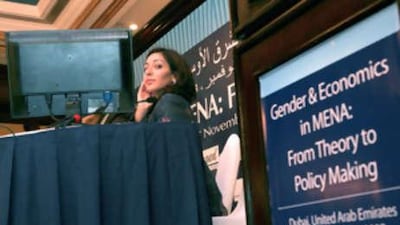DUBAI // An equal opportunities "watchdog" has been created to monitor the gender implications of laws and recommend how they can be improved. The Community Development Authority has established a research unit which can make recommendations to Government if it finds an existing law is biased in favour of men, said Dr Mariam Matar, the authority's director general.
She told a gender and economics conference in Dubai that the committee had already drawn to the Government's attention a Dubai federal law that grants married Emirati couples a house, but only under the husband's name. Dr Matar said the recommendation for modifying the property ownership law was already under consideration by the Government of Dubai, and hinted that the approval announcement was only a matter of time.
"By allowing dual-ownership of the property, this will empower women," she said. "We are providing a framework that policy makers will be able to include in legislation. What we have found is the willingness of the Government to work with us in order to correct such gender-biased policies." The Community Development Authority was established three months ago by the Dubai Government to develop frameworks for social development, many of which target women in the UAE. Over the past few months it has carried out comprehensive research on the social and cultural traits, needs and developments of Dubai citizens.
The results will be published on Dec 20, Dr Matar told delegates at the second and final day of the conference, Gender and Economics in the Middle East and North Africa: From Theory to Policy Making. Researchers and academics at the conference agreed there was a great need for gender-based research and access to reliable data to draw up policies that would help Arab women. Waduda Badran, the director general of the Arab Women Organisation, said: "The issue of finding a scientifically-based solution for gender issues is imperative in order to achieve economic and human security for women in the region."
Ms Badran echoed the need for measurable indicators that would reflect the true status of women in the region, as well as track the social changes as a result of policies. Failure to integrate research results into the decision-making process produces what experts call an "advocacy gap" that, in turn, leads to the inefficiency of both the research and social development processes of societies. May Dabbagh, from the Dubai School of Government, said it was important to learn from examples of gender-specific research aiding the advancement of women. "There's a great need for case studies in the Middle East so that we can bridge the gap between what we don't know and how we can move forward."
The more challenging part of public policy in the region is the process of drawing up laws that would target gender-based social aspects in need of correction, the conference heard. Women in the region, for instance, suffer discrimination in the workplace and experience reproductive health problems compared to developed countries, including high rates of infant mortality and sexually transmitted diseases.
However, reliable statistics documenting the severity of such problems are either nonexistent, or kept from the public. Dr Ragui Assad, the professor of planning and public affairs at the University of Minnesota's Humphrey Institute, said: "Less than 0.1 per cent of surveys conducted in the Middle East and North Africa region are available to the public. There is this fear that something embarrassing will come out of the data.
"Many researchers in the region do not have such privileged access to women or their immediate social networks to conduct such research," said Dr Nafisa Bedri, the associate professor in women and community health at the Afhad University in Sudan. While Nadareh Chamlou, the senior adviser for the World Bank in the MENA region, pointed out that women and some governments had made great strides in advancing the cause of women by increasing the amount of females in education and employment.
However, she said there were gaps in the region between the laws on paper and the reality on the ground. "It is important for civil society to monitor and act as a reality check for what is being implemented and what is not," she said. The conference was organised by the Dubai School of Government, the Centre for Arab Women for Training and Research and the World Bank. talramahi@thenational.ae

